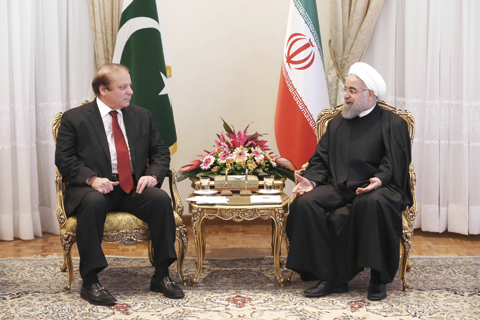 TEHRAN: Iranian President Hassan Rouhani meets Pakistani Prime Minister Nawaz Sharif yesterday. — AP
TEHRAN: Iranian President Hassan Rouhani meets Pakistani Prime Minister Nawaz Sharif yesterday. — AP
TEHRAN: Iran's supreme leader Ayatollah Ali Khamenei warned yesterday against American "deceit", just days after the end of sanctions under a nuclear deal that the central bank said would unblock $32 billion. The remarks underscored the still-strained relations between Tehran and Washington, which unveiled new missile-linked sanctions against Iran on Sunday almost as soon as the nuclear-related measures were scrapped. In his first comments since the atomic agreement was implemented at the weekend, Khamenei told President Hassan Rouhani in a letter to "guard against deceit and violations of arrogant states particularly the United States".
Rouhani wrote to Khamenei on Monday to provide an update after the UN atomic watchdog declared Saturday that Iran had met conditions stipulated in the nuclear deal. "We have to watch if the other parties fulfil their commitments," the supreme leader wrote in response. Washington cut diplomatic ties with Iran in 1979, when its embassy in Tehran was stormed by students, months after the Islamic revolution, leading to a 444-day hostage crisis. Khamenei has never endorsed repairing relations with the US and has largely followed a similar tack to Iran's late leader Ayatollah Ruhollah Khomeini, who dubbed America the "Great Satan".
Meanwhile, Pakistan's prime minister offered yesterday to host talks between Iran and Saudi Arabia aimed at resolving disputes between the Middle Eastern rivals. Nawaz Sharif met Rouhani in Tehran, a day after meeting Saudi Arabia's King Salman in Riyadh. After his meeting with Rouhani, Sharif told reporters that Iran had expressed an interest in improving relations with Saudi Arabia and would appoint a focal person for future talks. Sharif said he would speak to Saudi Arabia to encourage the appointment of a focal person, and described reconciling the two countries as Pakistan's "prime duty and sacred mission." Pakistan's Foreign Ministry said that Islamabad is deeply concerned at the recent escalation of tensions between Saudi Arabia and Iran.
Recession and Unemployment
Opening up to the world cannot completely fix the economy, Rouhani said yesterday in a televised speech, warning the "difficult road has just begun". "Today is just the start for an innocent human who was kept chained unjustly by the hands and feet for 12 years," said the president. "Sanctions are gone but there is a long way between sanctions and development," he said, speaking to an economics conference in Tehran. "Today, our main problem is unemployment and recession, the lack of a booming economy and many structural and economic deficiencies."
Iran hopes that steps to ease its isolation, including the re-admission of its banks to the SWIFT system of international transactions, will inject new vigour into the economy. The central bank said that $28 billion (25.8 billion euros) of the unfrozen funds would go to it and $4 billion "will be transferred to the state treasury as the share of the government". The assets, which had been held in foreign banks, will be kept "in centralised and safe accounts" abroad, central bank chief Valiollah Seif was quoted by state television as saying, adding that the money could be used to pay for imports.
Iran's economy suffered greatly under the international sanctions that since 2006 targeted the Islamic republic's nuclear program and financial systems. Under the previous hardline government of Mahmoud Ahmadinejad, inflation topped 40 percent. But moderate Rouhani, whose election in 2013 heralded more than two years of nuclear negotiations with world powers, managed to curb inflation to 13 percent.
Foreign Investment
Iran needs annual foreign investment of $30-$50 billion to reach an eight percent growth target and cash in on sanctions relief, the president said Sunday. "Untapped potential in many industries indicates that domestic demand alone cannot drive the economy" towards that goal, he said, signalling a shift in policy. Iran announced a major boost of 500,000 barrels per day in oil production on Monday - a move Tehran had long planned for once its nuclear deal with world powers took effect.
The next budget starting in March is based on a projected oil price of $40 per barrel price and exports of 2.25 million barrels per day. Iran, a member of the Organization of Petroleum Exporting Countries (OPEC), now produces 2.8 million barrels of oil per day and exports just over one million barrels. Low oil prices and years of US and European Union sanctions that barred much of Iran's foreign oil sales hammered its income from crude. But despite global prices falling below $30, Iran intends to increase production to recoup lost market share. - AFP
.jpg)



